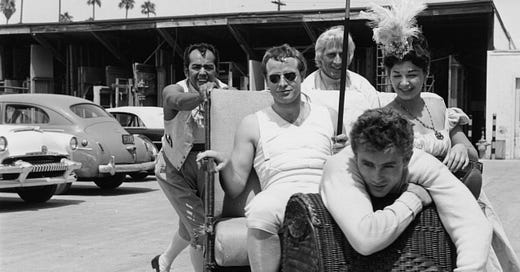The Human Ashtray Returns
"Vanity Fair" resurrects false claims about a Marlon Brando/James Dean BDSM relationship--and drags me into it.
Vanity Fair’s Spanish edition ran a lengthy piece today discussing the strained professional relationship between Marlon Brando and James Dean, who idolized Brando right up until he met him in person. For reasons known only to them, Vanity Fair has long had a weirdly hostile attitude toward James Dean. The American edition has published numerous stories casting Dean in a bad light or implying that there was something deeply disturbed about him. True to form, Vanity Fair let today’s piece stray increasingly far from the facts toward rumor and innuendo, but this time the magazine decided to drag me into it.
The first two-thirds of the piece by Juan Claudio Matossian is a fairly standard account of Brando’s and Dean’s early professional careers and the brief interactions they had in the days surrounding Brando’s set visit to East of Eden that Elia Kazan had arranged, ostensibly as a reward for Dean but secretly to intimidate Dean.
Then, however, the final third veers into titillation, resurrecting the obviously false claim put forward by Danforth Prince and Darwin Porter in their 2008 Brando biography and 2016 James Dean biography that the two actors had a BDSM relationship in which Dean was Brando’s sex slave. Although Matossian notes that Porter and Prince are dubious sources, and even links to my Substack column explaining the problems with their allegations, he nevertheless makes this claim the largest section of his story, even raising the allegation to the dignity of a “legend”—a “legend” that did not exist before the authors invented it in 2008.
Then, to add insult to injury, Matossian throws in my book, Jimmy: The Secret Life of James Dean, as though I supported Prince and Porter. Matossian even trashes my book with the same adjective he uses to descript Porter and Prince’s volume: “sensationalist.”
In translation, here are the last three paragraphs:
In it (the book) they state that James Dean and Marlon Brando had an affair that began with a kiss after a long conversation at the Actors Studio (the source cited is Robert Lewis, co-founder of the school and who died in 1997, so it could not be corroborated after publication).
The book also includes the testimony of Rogers Brackett, Dean's mentor and alleged lover – he died in 1993; in another sensationalist volume, Jimmy: The Secret Life of James Dean, by Jason Colavito, it is claimed that Brackett blackmailed his protégé by making public their relationship just before the premiere of East of Eden if he did not pay him $800 – recounting that Dean was little more than a sex slave to Brando: “He had burns on his chest. Jimmy told me that they were from cigarette burns by Brando. I was practically ready to call the police on this brutal son-of-a-bitch until Jimmy told me that he’d asked Brando to do that to him.”
Composer Alec Wilder (who died in 1980) is also quoted, who allegedly also confirmed that the actors “were definitely a couple” and that “I really believe that Jimmy fell in love with Brando that year. As for Brando, I don’t think he ever loved Jimmy.
(emphasis in original; I have cleaned up the quotations, as the Spanish translations bore a loose relationship to the English-language originals)
Matossian, despite knowing that Porter and Prince are unreliable and that their story is factually impossible nevertheless offers his readers no reason to doubt it and ends the article with not one but two false quotations wildly at odds with the historical record. In no other interview did either Brackett or Wilder say anything similar, and the claim about the cigarette burns comes from Kenneth Anger, who in the original French edition of Hollywood Babylon called Dean the “human ashtray” after apparently misunderstanding a friend’s discussion of 1950s New York BDSM clubs and the emulation of James Dean by patrons.
But it miffs me that Matossian puts my work in the same category as Porter and Prince (or Anger, for that matter), and it is quite obvious that he has not read my book, or else he would know that I did not claim this information from rumor but reported what was stated plainly in contemporary documents—an actual historical record, something Porter and Prince completely lack. I also spoke with the only people left who had conversations with Rogers Brackett about this—Dean biographer Ronald Martinetti, who had the only interview with Brackett about Dean before his death; and Brackett’s roommate in the years before his death (which occurred in the 1970s, not 1993)—and, in short, Brackett never made these claims to anyone left alive who could testify to them.
This greatly reduces the likelihood that Brackett, who famously refused to speak about Dean until he was nearly on his deathbed (due to the midcentury equivalent of an NDA), would have entrusted his most sensitive knowledge to Darwin Porter, then a travel writer and aspiring novelist.




